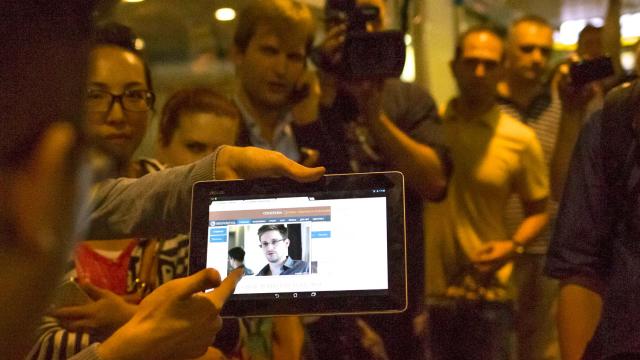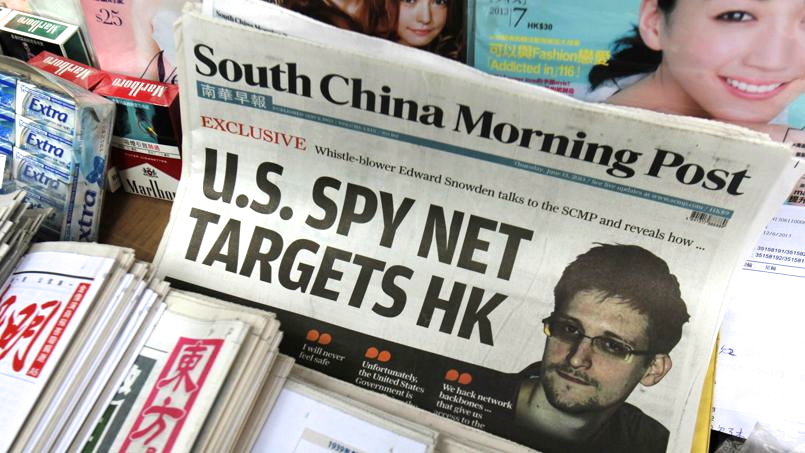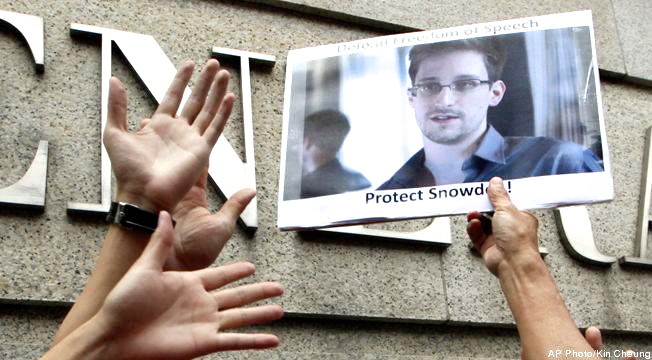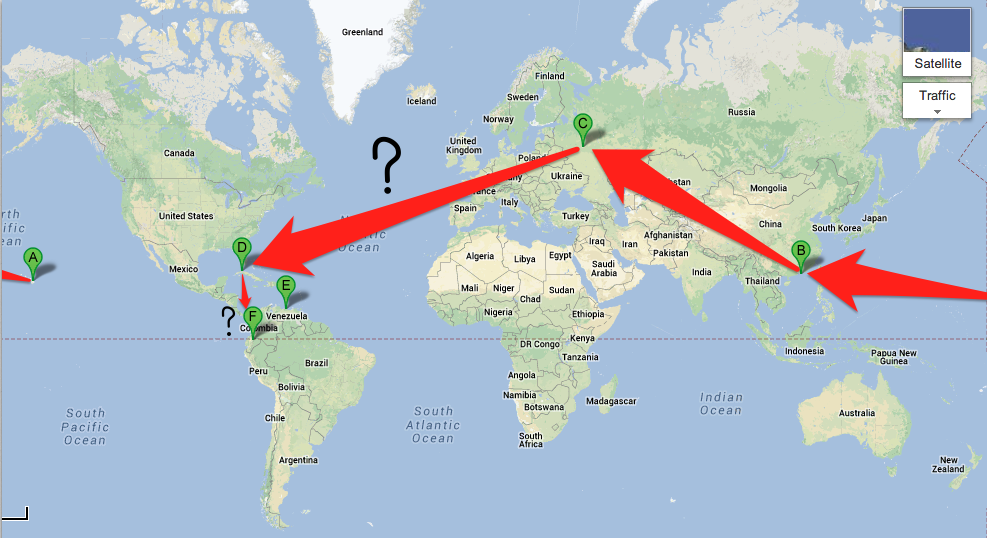
The U.S. government has charged Edward Snowden with three felonies, including two under the Espionage Act, the 1917 statute enacted to criminalize dissent against World War I. My priority at the moment is working on our next set of stories, so I just want to briefly note a few points about this.
Prior to Barack Obama's inauguration, there were a grand total of three prosecutions of leakers under the Espionage Act (including the prosecution of Dan Ellsberg by the Nixon DOJ). That's because the statute is so broad that even the U.S. government has largely refrained from using it. But during the Obama presidency, there are now seven such prosecutions: more than double the number under all prior U.S. presidents combined. How can anyone justify that?
For a politician who tried to convince Americans to elect him based on repeated pledges of unprecedented transparency and specific vows to protect "noble" and "patriotic" whistleblowers, is this unparalleled assault on those who enable investigative journalism remotely defensible? Recall that the New Yorker's Jane Mayer said recently that this oppressive climate created by the Obama presidency has brought investigative journalism to a "standstill," while James Goodale, the General Counsel for the New York Times during its battles with the Nixon administration, wrote last month in that paper that "President Obama will surely pass President Richard Nixon as the worst president ever on issues of national security and press freedom." Read what Mayer and Goodale wrote and ask yourself: is the Obama administration's threat to the news-gathering process not a serious crisis at this point?
Few people - likely including Snowden himself - would contest that his actions constitute some sort of breach of the law. He made his choice based on basic theories of civil disobedience: that those who control the law have become corrupt, that the law in this case (by concealing the actions of government officials in building this massive spying apparatus in secret) is a tool of injustice, and that he felt compelled to act in violation of it in order to expose these official bad acts and enable debate and reform.
But that's a far cry from charging Snowden, who just turned 30 yesterday, with multiple felonies under the Espionage Act that will send him to prison for decades if not life upon conviction. In what conceivable sense are Snowden's actions "espionage"? He could have - but chose not - sold the information he had to a foreign intelligence service for vast sums of money, or covertly passed it to one of America's enemies, or worked at the direction of a foreign government. That is espionage. He did none of those things.
What he did instead was give up his life of career stability and economic prosperity, living with his long-time girlfriend in Hawaii, in order to inform his fellow citizens (both in America and around the world) of what the U.S. government and its allies are doing to them and their privacy. He did that by very carefully selecting which documents he thought should be disclosed and concealed, then gave them to a newspaper with a team of editors and journalists and repeatedly insisted that journalistic judgments be exercised about which of those documents should be published in the public interest and which should be withheld.
That's what every single whistleblower and source for investigative journalism, in every case, does - by definition. In what conceivable sense does that merit felony charges under the Espionage Act?
The essence of that extremely broad, century-old law is that one is guilty if one discloses classified information "with intent or reason to believe that the information is to be used to the injury of the United States, or to the advantage of any foreign nation." Please read thisrather good summary in this morning's New York Times of the worldwide debate Snowden has enabled - how these disclosures have "set off a national debate over the proper limits of government surveillance" and "opened an unprecedented window on the details of surveillance by the NSA, including its compilation of logs of virtually all telephone calls in the United States and its collection of e-mails of foreigners from the major American Internet companies, including Google, Yahoo, Microsoft, Apple and Skype" - and ask yourself: has Snowden actually does anything to bring "injury to the United States", or has he performed an immense public service?
The irony is obvious: the same people who are building a ubiquitous surveillance system to spy on everyone in the world, including their own citizens, are now accusing the person who exposed it of "espionage". It seems clear that the people who are actually bringing "injury to the United States" are those who are waging war on basic tenets of transparency and secretly constructing a mass and often illegal and unconstitutional surveillance apparatus aimed at American citizens - and those who are lying to the American people and its Congress about what they're doing - rather than those who are devoted to informing the American people that this is being done.
Meanwhile, Tania Branigan, Miriam Elder and Nick Hopkins reported in The Guardian that Snowden, after escaping Hong Kong on a commercial flight Sunday morning to Moscow -- despite a U.S. extradition request -- has sought political asylum in Ecuador where he will attempt to fly safely on Monday.
The intelligence whistleblower Edward Snowden will on Monday attempt to complete an audacious escape to the relative safety of South America after his departure from Hong Kong escalated already fraught diplomatic relations between the United States and China.
In a move that appeared to bewilder the White House, Snowden was allowed to flee Hong Kong on Sunday morning and head to Moscow on a commercial flight despite a formal request from the U.S. to have the 30-year-old detained and extradited to face espionage charges for a series of leaks about the National Security Agency (NSA) and Britain's spy centre, GCHQ.
Arriving in Moscow, Snowden disappeared again, leaving the aircraft without being spotted, but being pursued by the Ecuadorian ambassador, Patricio Chávez, amid speculation that he will fly to Quito on Monday, possibly via Cuba.
Snowden has asked for political asylum in Ecuador, the country that has also given shelter to the WikiLeaks founder, Julian Assange, at its embassy in London.
In a statement on Sunday night, WikiLeaks, which has been providing legal and logistical help to Snowden in recent days, said: "He is bound for the Republic of Ecuador via a safe route for the purposes of asylum, and is being escorted by diplomats and legal advisers from WikiLeaks."
"Mr Snowden requested that WikiLeaks use its legal expertise and experience to secure his safety. Once Mr Snowden arrives in Ecuador his request will be formally processed."Snowden's escape from Hong Kong infuriated U.S. politicians, while China focused on condemning Washington over his latest disclosures, which suggested the NSA had hacked into Chinese mobile phone companies to access millions of private text messages.
Moscow was also drawn into the controversy after it emerged that Snowden's passport had been revoked before he left Hong Kong and he did not have a visa for Russia. But Russia appeared indifferent to the uproar, with one official saying Snowden was safe from the authorities as long as he remained in the transit lounge at the city's Sheremetyevo airport.
Dmitry Peskov, spokesman for the Russian president, Vladimir Putin, said: "I know nothing."
In Washington, congressmen fulminated at the array of powers suddenly ranged against the US. Mike Rogers, chairman of the House permanent select committee on intelligence, railed at Russian president Vladimir Putin over his attitude to Snowden, suggesting an ulterior motive. "I'm sure they would love to have a little bit of coffee and some conversation with Mr Snowden," Rogers said.
The Democratic senator Chuck Schumer added: "The bottom line is very simple: allies are supposed to treat each other in decent ways, and Putin always seems almost eager to put a finger in the eye of the United States, whether it is Syria, Iran and now of course with Snowden. That's not how allies should treat each other and I think it will have serious consequences for the United States-Russia relationship."
Washington will also challenge Hong Kong over its decision to let Snowden flee. In a statement, the Hong Kong Special Autonomous Region (HKSAR) said it could not have stopped Snowden because America's request to detain him on a provisional warrant – filed in papers last week – did not fully comply with legal requirements. "As the HKSAR government has yet to have sufficient information to process the request for provisional warrant of arrest, there is no legal basis to restrict Mr Snowden from leaving Hong Kong," the statement said.
Yet the admission that Snowden had been allowed to leave was made five hours after he had boarded an Aeroflot flight to Moscow, and the discovery of the oversight came two days after the papers had been formally sent.
Snowden, a former NSA contractor, had previously said he would stay in Hong Kong and fight for his freedom through the courts. He had been at a safe house after giving an interview to the Guardian revealing himself as the source who leaked top-secret U.S. documents.
Since then, Snowden has been in touch with WikiLeaks, which revealed on Sunday that it had been instrumental in helping him find safe passage out of Hong Kong.
Speaking to the Sydney Morning Herald from the Ecuadorian embassy in London, Julian Assange said: "Owing to WikiLeaks' own circumstances, we have developed significant expertise in international asylum and extradition law, associated diplomacy and the practicalities in these matters. I have great personal sympathy for Ed Snowden's position. WikiLeaks absolutely supports his decision to blow the whistle on the mass surveillance of the world's population by the U.S. government."
On Saturday, the South China Morning Post disclosed details of new documents from Snowden, which suggested the NSA had hacked into Chinese phone companies.
For the second time in 10 days General Keith Alexander, the head of the NSA, had to defend the agency's activities, and he did not deny the latest allegations.
"To say that we're willfully just collecting all sorts of data would give you the impression that we're just trying to canvas the whole world," Alexander said.
"The fact is what we're trying to do is get the information our nation needs, the foreign intelligence, that primary mission. The case that Snowden has brought up is in defending this nation from a terrorist attack. I'm confident that we're following the laws that our country has in doing what we do. We have a set of laws that guide how NSA acts; we follow those laws. We have tremendous oversight by all three portions of the government: the courts, Congress and the administration."
But China's official Xinhua news agency said the revelations had "put Washington in a really awkward situation".
"They demonstrate that the United States, which has long been trying to play innocent as a victim of cyber attacks, has turned out to be the biggest villain in our age," it said.
The fall-out from Snowden's leaks continued to stir the surveillance debate in the UK, with Shami Chakrabarti, the director of Liberty, insisting David Cameron or the foreign secretary, William Hague, should address MPs.
On Friday, the Guardian revealed GCHQ has put taps on some of the cables that carry internet traffic in and out of the UK, and has developed a storage system - codenamed Tempora - that can keep the information for up to 30 days.
The programme, which has not been disclosed before, allows GCHQ to keep a vast amount of emails and telephone calls for analysis.
Chakrabarti said: "The authorities appear to be kidding themselves with a very generous interpretation of the law that cannot stand with article 8 of the European Convention on Human Rights.
"Revelations of blanket surveillance of the British public on such a scale amount to a huge scandal even by the standards of recent years. At the very least, the prime minister or foreign secretary should appear before the House of Commons immediately to explain how this was justified without clear legal authority or parliamentary debate."
GCHQ has said it complies fully with British law.
3 WAYS TO SHOW YOUR SUPPORT
- Log in to post comments


















